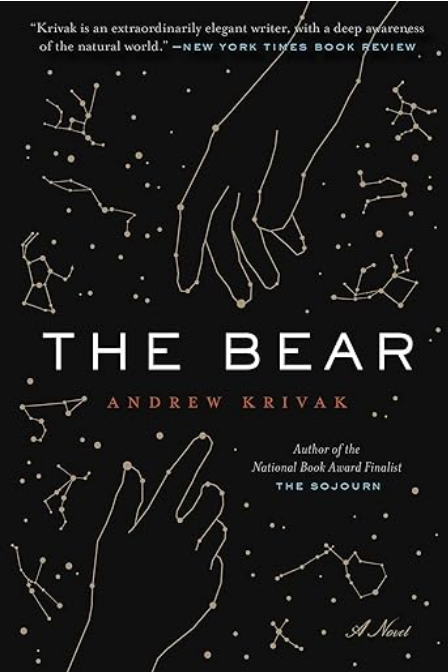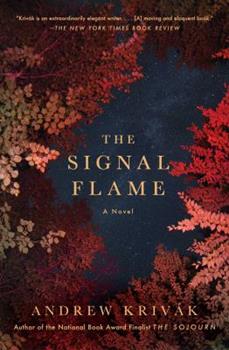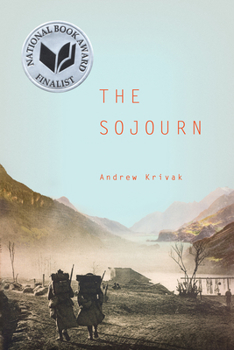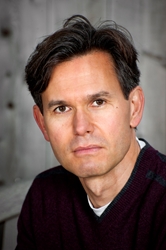

Andrew Krivak
Acclaimed Novelist
National Book Award Finalist
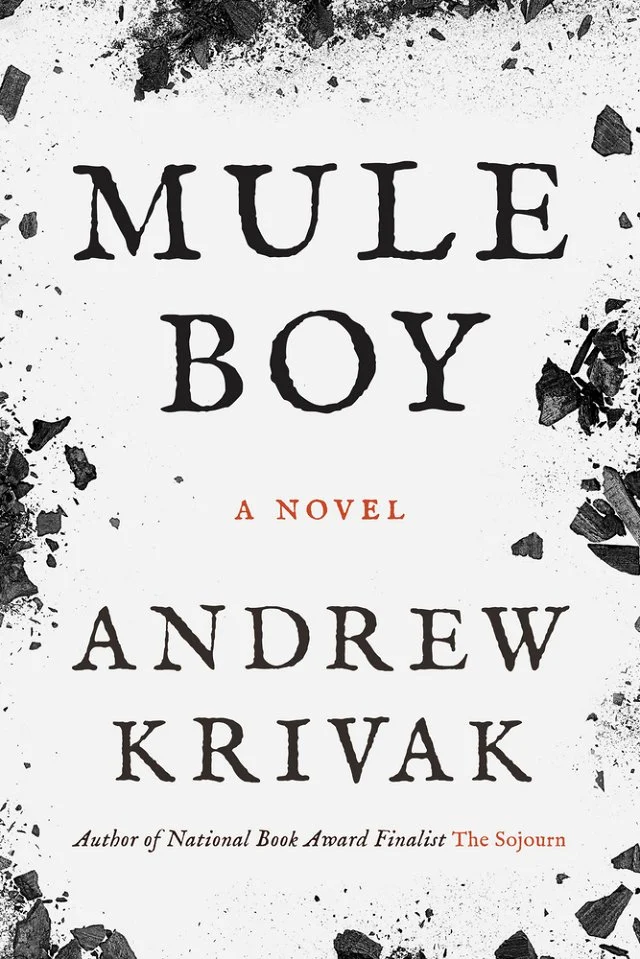
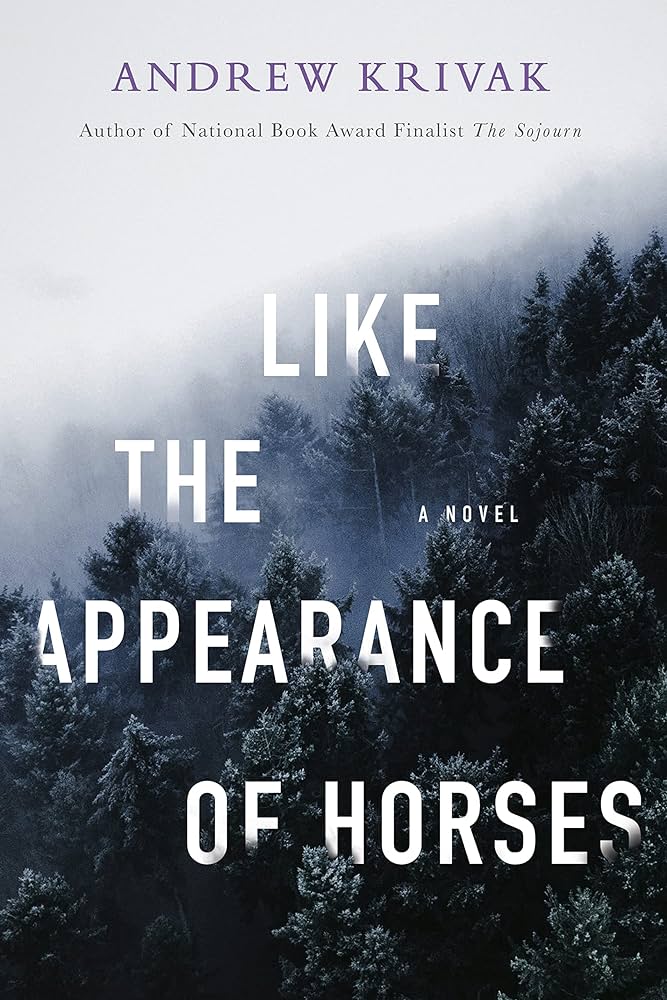
Readings &
Lecture Topics
- An Evening with Andrew Krivak
Biography
“Krivak is a novelist, poet, and memoirist whose work has been compared to William Faulkner’s in its rich sense of place, to Wendell Berry’s in its attentiveness to natural beauty, and to Cormac McCarthy’s in its deep investigation of violence and myth. Yet all of Krivak’s writing, and especially his fiction, presents a truly singular vision.” –Image
Andrew Krivak is the author of five novels, two chapbooks of poetry, and two works of nonfiction. His 2011 debut novel, The Sojourn, was a National Book Award finalist and winner of both the Dayton Literary Peace Prize for fiction and the inaugural Chautauqua Prize. He followed The Sojourn with The Signal Flame (2017), a novel The New York Times said evoked “an austere landscape, a struggling family, and a deep source of pain” in Krivak’s fictional Dardan, Pennsylvania. His third novel, The Bear (2020), received the Banff Mountain Book Prize for fiction and is a National Endowment for the Arts Big Read title. Like the Appearance of Horses (2023), returns to the characters and landscape of Dardan. Of the work, Asako Serizawa observed: “Andrew Krivak’s Homeric novel is at once intimate and sweeping, expanding an epic story set into motion in The Sojourn. Tenderly attentive to all that is given and taken by war, Like the Appearance of Horses is a graceful, heroic accomplishment that speaks to the costs of duty when violence is as constant as the Pennsylvania mountains that anchor and separate this indelible family we’ve come to know so personally.” His fifth novel Mule Boy is forthcoming with Bellevue Literary Press in 2026.
As a poet, Krivak has published the chapbooks Islands (1999), and Ghosts of the Monadnock Wolves (2021). He is also author of the memoir A Long Retreat: In Search of a Religious Life (2008), and editor of The Letters of William Carlos Williams to Edgar Irving Williams, 1902-1912 (2009), which won the Louis Martz Prize for scholarly research on William Carlos Williams.
He holds an MFA in poetry from Columbia University, an MA in philosophy from Fordham, and a PhD in literary modernism from Rutgers University. Krivak lives with his wife and three children in Somerville, Massachusetts, and Jaffrey, New Hampshire.
He is currently the visiting lecturer in creative writing at Harvard University.
Visit Author WebsiteVideos
Publications
Mule Boy
Novel, 2026
“Andrew Krivak is one of contemporary fiction’s finest architects of the line, and I am utterly swept away by his lyric, daring, and kinetic music. Mule Boy is a riveting exploration of the ghosts we carry coiled within us—and what is unleashed when they leap out into the present. This book is as brilliant and sure as a bolt of lightning.” —Laura van den Berg
On New Year’s Day, 1929, Ondro Prach, the thirteen-year-old son of Slovak immigrants in Pennsylvania coal country, begins a new job as mule boy. He knows the danger–his father died in the mines–but he is proud of his position handling the animal that hauls cartloads of coal from shafts deep within the earth to the surface. After Ondro earns the trust of the miners and the mule in his charge, the room the men are working collapses and their fate is sealed.
From that moment onward, Ondro carries the hard memory of that day, a burden that leads to addiction and imprisonment, costing him his family. But, years later, when the miners’ loved ones come searching for answers, he finds the strength to share what the men spoke of and prayed for in the pitch black.
Told in incantatory prose set to the rhythm of human breath, this sublime novel turns the memento mori into a meditation not only on death but on what it takes to tunnel through darkness and live.
Like the Appearance of Horses
Novel, 2023
Rooted in the small, mountain town of Dardan, Pennsylvania, where patriarch Jozef Vinich settled after surviving World War I, Like the Appearance of Horses immerses us in the intimate lives of a family whose fierce bonds have been shaped by the great conflicts of the past century.
After Bexhet Konar escapes fascist Hungary and crosses the ocean to find Jozef, the man who saved his life in 1919, he falls in love with Jozef’s daughter, Hannah, enlists in World War II, and is drawn into a personal war of revenge. Many years later, their youngest son, Samuel, is taken prisoner in Vietnam and returns home with a heroin addiction and deep physical and psychological wounds. As Samuel travels his own path toward healing, his son will graduate from Annapolis as a Marine on his way to Iraq.
In spare, breathtaking prose, Like the Appearance of Horses is the freestanding, culminating novel in Andrew Krivak’s award-winning Dardan Trilogy, which began with The Sojourn and The Signal Flame. It is a story about borders drawn within families as well as around nations, and redrawn by ethnicity, prejudice, and war. It is also a tender story of love and how it is tested by duty, loyalty, and honor.
The Bear
Novel, 2020
In an Edenic future, a girl and her father live close to the land in the shadow of a lone mountain. They possess a few remnants of civilization: some books, a pane of glass, a set of flint and steel, a comb. The father teaches the girl how to fish and hunt, the secrets of the seasons and the stars. He is preparing her for an adulthood in harmony with nature, for they are the last of humankind. But when the girl finds herself alone in an unknown landscape, it is a bear that will lead her back home through a vast wilderness that offers the greatest lessons of all, if she can only learn to listen.
The Signal Flame
Novel, 2017
In their small town in northeastern Pennsylvania, Hannah and her son Bo mourn the loss of the family patriarch, Jozef Vinich. They were three generations under one roof, a war-haunted family in a war-torn century, but only one branch of a scraggy tree.
Having survived the trenches of World War I as an Austro-Hungarian conscript, Jozef journeyed to America and built a life for his children. His daughter Hannah married the European-born Bexhet Konar, who deserted the American army in World War II and, after his imprisonment, was killed in a hunting accident on the family land. Finally, in 1971, Hannah’s prodigal younger son, Sam, was reported missing in action in Vietnam.
Bo, Hannah’s remaining child, chooses a different path from his brother: Quiet, full of conviction, and with a firstborn’s sense of duty, Bo remains at home to grieve and to hope for reunion, to create new life, to embrace the land and work. From the narrative of this family’s experience, The Signal Flame emerges as a stirring novel about generations of men and women and the events that define them, old world values yielding to new world ways, and the convalescence of memory and hurt.
Beginning shortly after Easter in 1972 and ending on Christmas Eve, this ambitious novel gracefully evokes ordinary time, a period of living and working while waiting and watching and expecting. The Signal Flame is gorgeously written, honoring the cycles of earth and body, humming with blood and passion, and it confirms Andrew Krivák as a writer of extraordinary vision and power.
The Sojourn
Novel, 2011
A poignant tale of fathers and sons, addressing the great immigration to America and the desire to live the American dream amid the unfolding tragedy in Europe.
Articles & Audio
Read What’s In Print
• Andrew Krivak’s The Bear takes a gentler approach to post-apocalyptic fiction – Washington Post
• Review: The Bear by Andrew Krivak – Kirkus Reviews
• The Bear Is a Mesmerizing Fable About the End of Humanity – Slate
• Review: Like the Appearance of Horses by Andrew Krivak – Kirkus Reviews
• A Conversation with Andrew Krivak – Chestnut Review
Listen to Audio
• Being is Action with Andrew Krivak – Contemplify
• New novel Like the Appearance of Horses asks provocative questions about the past – WBUR
Selected Writings
Like the Appearance of Horses (a novel excerpt)
Snow fell all night and by morning the front was gone. They skied down to the col des Ecandies, then removed their skis and strapped them to their packs and took out ice axes and boot- packed up the slope for several hundred meters. When they came through the gap, the sun had broken the white and granite hori- zon of the mountains to the east, and they looked out across the vast Val d’Arpette, put their skis back on, and skied on deep snow another two hours through the wide-open bowl into an alpine meadow and the village of Champex-Lac, where they walked among winter guests who seemed not to know or care that there was a war on, and never once looked or even glanced at the two climbers filthy and sunburned and carrying skis and ropes and ice axes on their backs.
Bruno entered a ski shop and nodded to a man at a desk and this man led them into the store and out a back door and into the alley, where a small truck was idling. They placed their packs and skis in the truck bed and got into the cab with the driver and drove to Bourg-Saint-Pierre, where they slept in a barn next to the house where the driver of the truck lived. There were neither names, nor greetings, nor food exchanged. Only shelter. The driver woke them before dawn and took them to the edge of town, where they got out and began to hike along a path thin with snow and sprin- kled with larch needles. When the snow was deep enough, they put on their skis and skins and began their ascent along the trail that led out of Bourg-Saint-Pierre.
They came to the Cabane de Valsorey just after noon. Bruno stopped at a distance from the door of the hut. He expected there to be a set of tracks laid by the guide who manned the hut, and there was, along with the imprint of a single pair of poles. But when he looked closer, he could see there were tracks inside the single track. He followed these along his line of sight and saw by the door the place where one of the other skiers had put his poles, too, into the snow. Bruno thanked him for his mistake, held a fin- ger to his lips, and pointed to the tracks for Becks, and they skied away from the hut in tracks of their own making.
They bivouacked beneath a shelter of rocks that could not be seen from Valsorey and put on every article of clothing they had, then their white ski suits, and huddled in the snow against the ledge. Bruno told him there were Germans in the hut, he was cer- tain. Jäger forces who had likely come up from the Italian side and did not want to be seen by the way they had approached. There was no telling if the Swiss guide in the hut was dead or alive. They would get what sleep they could and rise early to climb the pla- teau, then continue on to the col du Sonadon, and make their way to the Cabane de Chanrion, if the Jäger hadn’t seen them by then.
In the morning they rose without speaking, so cold was it, and they packed up and put crampons on their boots and began the ascent to the plateau du Couloir, the sun low and south in the winter sky. At the traverse, Bruno looked back and told Becks they were being followed. Six armed Jäger beginning their ascent. At the plateau, they removed their crampons and put on their skis, and Bruno bemoaned the good weather and the tracks they would leave. Then he clasped Becks on the shoulder.
We have a descent, a short climb, and then another long ski down the glacier, he said. Stay right behind me. These men are fast, but if we can make it to Chanrion, there are others there who can help us. If not, then we’ll be frozen together for a long time, my friend. Es-tu prêt?
Becks nodded and they took off in single file down the glacier.
The skiing was not easy, and as much as Bruno seemed to want to drop as fast as he could in a straight line down the snowfield, he would pick one line of descent, abandon it, and begin another. Becks knew in his exhaustion he was slowing his guide down, but Bruno stayed with him and told him, when they came within ear- shot, that the crevasses were large and everywhere on this glacier, and the new snow made them difficult to detect. He looked over his shoulder even as he spoke.
Allons-y, he said in a resigned tone.
And they skied on.
At the col du Sonadon, Bruno and Becks both could see that the Jäger had topped the plateau and begun their own descent. Bruno looked at Becks and nodded and they skied through the pass and Bruno halted below it and told Becks there was only one way to stop them now. He riffled through his pack and took out a grenade.
You have to keep going, he said. Fast, if you are going to get out ahead of the avalanche.
But the crevasses? Becks asked.
One way or the other, Bruno said, and seemed to smile.
Then he told Becks not to worry, that he’d be right behind once the slide settled, and he reached into a side pocket on his pack and took out a compass and handed it to him.
Take this. Follow the glacier and ski southeast. You won’t see Chanrion until you’re right on top of it. God be with you, my friend.
Then Bruno began to climb up the rocky side of a convex slope that led out and onto a ridge, at the top of which a massive cornice of snow overhung, and Becks watched his guide scramble across the ridge like a goat born to it. Becks turned and poled down the mountain as fast as he could.
He looked back only once before the ridge and snow were out of sight, and he saw the figure of Bruno on the slope above, the six Jäger skiing in short turns down the snowfield that checked and crossed the tracks he and Bruno had laid so meticulously there. Then he watched as the guide who had brought him through these mountains leaned back to throw the grenade like a bowler on a cricket pitch, and the Jäger in the lead stopped at the face and raised his rifle. Bruno, arm out still, tumbled off the ridge, the sound of the rifle crack whipping across the glacier in the space of a breath. Then there came the low, muffled thump of the grenade blast Becks could feel in the ice beneath his feet. And he watched as the massive cornice of snow began to break and slide with the growing roar of something that sounded as though the mountain itself were separating from the earth, those men of the Jäger help- less and scrambling now in its path. And Becks turned and kicked hard in his skis and the new snow and descended fast.
The Bear (a novel excerpt)
The mountain range towered snowcapped
and dusk-lit to the north when they emerged from the forest and stopped at the river. They could hear the rumble of the course for some time as they came through the woods, and now the roar of the current before them was so loud that they retreated back to the edge of the trees to make their camp.
The bear fished in an eddy from the river- bank and the girl raised a cookfire. Around the fire, after they had finished eating, the girl told the bear she and her father had walked along this same stretch when they came out of the high mountains, where they had to go in order to cross the river from west to east. Even in the middle of summer, her father had tied her to him, so strong was the current, and still she thought she would be swept away. The bear said it was a swift river and that he had seen a cub drown wading into it not far from where they now sat. They, too, would climb into the mountains ahead of them, he told her, but the high peaks were far off yet, too far to reach before winter at their pace. Tomorrow they would go due north and, if it didn’t snow, in a few days they would reach a cave where they could both shelter.
So I won’t get home, the girl said, not a ques- tion but the same flat, indifferent tone she had been using with the bear.
Not on this side of the solstice, he said to her. Not with this river in front of us and this much cold in the air.
We can follow the river until we come to the snows and I can cross on my own, the girl said.
Cross now where you could not cross before? the bear asked, and he pointed with his snout at the distant range, the sunset reflected in its alpenglow.
Already it’s begun, he said. We’ll climb until we come to the tree line. And then we both have to prepare.
The evening was colder than the one before and the girl built up the fire with the abundance of deadfall that lay all around, and with the river a short distance from the stand of beech in which they sat, its rushing current sounded to her like a chorus of more voices than she had ever heard, and she asked the bear again how it was he could speak.
The bear shifted and sighed and was quiet for a time. When he spoke finally, he said that long ago all the animals knew how to make the sounds the girl and her father used between them. But it was the others like her who stopped listen- ing, and so the skill was lost. As for the bear, he learned it from his mother, who learned it from her mother. Not all animals had the range of voice that could be heard, he said, but all living things spoke, and perhaps the real question was how she could understand him.
The girl sipped at her tin cup of pine-needle tea and considered the question, then said she found it hard to believe that all living things needed to speak.
Believe, said the bear. Whether you hear them or not, they need it like they need air to breathe.
The girl had found a place to sit by the fire in an old and gnarled system of tree roots that grew out of the ground like a wizened hand. She looked down at them in the firelight and followed them with her own hands as she fell deeper into thought, studying the way the beech roots formed a series of knuckles and fingers that branched from the thick silvery trunk and disap- peared into the ground.
What about trees? she asked.
Trees, too, said the bear, and glanced up in the dark at the tops of those same beech limbs. The trees are the great and true keepers of the forest, he said, and have been since the begin- ning. Some animals of old have said it was the trees themselves that taught them to speak, for they never make an unnecessary sound. Each word, like a breath, carries with it some good, some purpose. For this reason, trees are the wisest and most compassionate creatures in the woods. They will do all in their power to take care of everyone and everything beneath them, when they have the power to do it.
The girl’s doubt had turned to wonder now, and she leaned forward in the firelight and asked the bear, What do they sound like when they speak? It’s not like the sound of rustling leaves, is it?
The bear, too, now thought for a moment, and said, Go down to the riverbank. There is a stone there around which the floods have passed for so long that a deep eddy has been dug on the downstream side. That’s where I’ve been catch- ing my fish. Go and listen.
The girl stood and walked away from bear and beech along the bank to the water’s edge, where she found the stone and the hole and bent her ear toward the water that eddied slowly around the stone. She heard the sound of a gurgle and a hiss all at once, slower than the rest of the river rush- ing by, for the water seemed pulled back by the depth of the cut. She put her hand into the cur- rent as though to touch the sound, then pulled it out, walked back to the bear, and sat down.
The bear knew both what she had heard and not heard, and while she sat in silence now, he told her that the voices of the trees were the voice of the forest, and that when they spoke, they spoke with such indifference to time that it would take the girl several moons to hear one of their conversations, the better part of one just to hear a single word. But to them it was no dif- ferent from any story told to any other around a fire in the night, a word spoken in a moment, or a lifetime.
Did you never feel as though the trees around you on your mountain were somehow compan- ions to you and your father? asked the bear.
Yes, said the girl, and thought back to when she was younger and would sit alone in the for- est on a blanket of moss and listen to the wind. There were times when she believed she heard a voice that was not the wind, a voice as old and slow and gentle as water curling around stone.
Those were the trees, replied the bear, com- panions to us all who forget nothing that happens in the forest beneath them and whose memories span seasons beyond count. For each one carries the memory inside of every living thing that has ever touched it or passed beneath the shade of its limbs and leaves, trunk and branches. Every liv- ing thing that has ever walked the earth.
The bear looked into the fire then and said, The wood you burn to cook your food and keep you warm? The smoke that rises was once a memory. The ashes all that is left of the story it belonged to. Why else would you be carrying the ashes of your father?
The two were quiet then for a long time, until the girl put her hand on the pack she always had next to her and said, So they will remember us, won’t they?
For as long as they stand in the forest. Of that I am certain.
The Sojourn (an excerpt)
That night, we arrived at a camp on the Danube outside of Pozsony. A sergeant barked orders at us there in the dark, where we stood at attention for what seemed like hours, until two officers showed up, and the sergeant snapped to attention himself and then receded. One, another Austrian captain, did all the talking, while the other, whose uniform was German but whose overcoat looked more like some Bavarian hunter’s, stood by, listening and surveying us there in the harsh light.
Nineteen sixteen was the year the Austrians started sending sharpshooters to learn sniping skills for the front. Most of these schools recruited men from the Tirolean region of the Southern Alps, on the border with Italy, and were run by German officers. Scharfschützen, they called them. The Italians called them cecchini and (we were to learn in time) feared them more than anything else in those mountains. Under that veil of mock secrecy, it emerged that we were being sent to a place in Austria called Klagenfurt to be trained as Scharfschützen for the empire’s defense of its culture and threatened borders on the southern front. We had been chosen, the captain told us, not only for our marksmanship but for our character and ability to endure hardship in conditions under which most men would buckle, although I’m sure he knew or cared nothing about my character. The emperor himself understood who we were and how important our mission was, he said to us, and from there on out we were ordered never to speak unless spoken to by a superior officer, and any soldier showing the least amount of weakness or lack of discipline and restraint would be sent straight back to his regiment and a trench on the eastern front.
There we were, forty of us, men from the ranks—although there were only four other Slavs, two Bosnians, and two Czechs—brought together because we had a common skill that was about to be pressed into service. I didn’t understand what it meant then to have what the captain referred to as a gift. There were plenty of Frontkämpfer, he said, the frontline infantry, who wore the marksman’s badge and would line up in the trenches next to machine gunners when the enemy attacked. We weren’t riflemen, though. Weweren’t Frontkämpfer. We were hunters who already knew how to stalk game in the mountains and forests we had lived in before the war, and who were now being taught to hunt men, observing their numbers, their movements, their skills or the lack of them, their habits, and ultimately their faces—front or back—through the crosshairs of a rifle scope, all so that we might kill them, one at a time, with a silence that terrified them more than anything because it held nothing of the glory they imagined they’d find in battle. In Klagenfurt, we trained and practiced—not just drilled but practiced—as though virtuosi who would one day be given their concert hall solos in some great symphonic concerto, conducted by our maestro, Sergeant Major Bücher, who had been fighting on the western front since August 1914, until he lost a leg to a long-range French shell that had caught him leaving the line at Verdun. He limped well enough with the prosthetic limb a puppet maker in Leipzig had carved for him, but the Germans were one sharpshooter down at the front as a result. So he offered his services as an instructor and would always say, as we stood at attention at dawn on snow-packed and frozen ground while he paced before us, that the sharpshooter should consider himself above rank and disregard it, as it is rank that ought to be hunted first, killing from the top down in order to leave an army leaderless and demoralized. Search for whom and what seems out of the ordinary, he instructed us. The nonuniform, the affectation. Field glasses around the neck out in the open. A scarf of school colors catching the wind. A knitted pullover. An umbrella.
“To desire rank is to desire death,” he intoned aphoristically. “You must find the soldier of rank, and find in yourselves the will to remain calm, silent, and alert. Then kill as though it were your only chance to live.”
For the first week, we never fired a shot. We cleaned our rifles six times a day and became familiar with the meticulous care of optical sights. We learned to read maps and draw maps and study maps taken from prisoners, so that we could see our ground from their perspective. We dressed in white cover to blend in with the snow during those late-winter months and practiced Nordic techniques until we could ski fifteen miles with a thirtypound pack on our backs and not fall. We learned how to range, judge distances, take into account variations of topography, spot and report small troop movement, and how to move instinctively—against the instincts of the average man— toward higher ground there in the Alps, while we sought out a good hide, and a good means of escape. That was, Bücher said, if we knew and could employ well the full quiver of our skills, the most important weapon we could find, a safe place to hide, and this exercise made up the second week of our training.
Each day, we disappeared into the woods, wanting to see and not be seen. Most of us they had chosen in twos, and so we worked in twos, Zlee and I seemingly inseparable now as spotter and shooter. After we were dismissed into the forests in teams, the remaining men fanned out to find us, just as my father and I had done in the mountains years ago, hunter and hunted making notes on details of an occupied position, until the hunter ultimately revealed his target. If the hunted—watching from the hide—had more information on the hunter, the teams switched roles. The one with better notes got the kill. Sometimes it was as insignificant as the fold in a man’s cap.
Zlee and I started out against a pair of Tiroleans from the Landesschützen, severe and insular men of the Alpine regions who had remained loyal to the Habsburgs. They kept to themselves and seemed especially derisive of the standard Austrian officers. They hated Slavs, too. It didn’t matter that we were fighting for the same king.
We found them easily enough because they whispered to each other in their mountain dialect as they hid in the socket of two large boulders, which created a kind of sounding board. They must have thought we couldn’t hear them if we couldn’t understand them, and so they cursed us when Zlee inched his head over the top of the rock, looked down, and said in a whisper, “Boom.” I had a page of notes on them, even jotting down a word I transliterated from their Austrian, which Bücher knew I could not have known, and he called them “useless joker,” and sent them back to their regiment. Once Zlee and I were given the chance to disappear, no one found us, not even Bücher, who had his own perch with a telescope, from which he made notes—good ones, too.
It was just as well that we couldn’t be found, because, but for the sergeant major’s attention, we were ignored. The men we trained with were mostly Austrians, and the training we got was unique to the man sent to instruct us. In spite of Bücher’s insistence that the best weapon the empire had were the men who lived and survived in her mountains, captains who did the recruiting chose as sharpshooters young Austrian men who knew the luxury of sport hunting and who arrived in Klagenfurt with their own rifles, like gentlemen showing up at school with their own horses. That’s where I saw my first Schoenauer, a beautiful and powerful rifle with the precision of a surgical instrument. I saw the Norwegian model of the Krag, German Mausers and Gewehr 98s sent down from the western front, and a few other strange-looking cannons that looked as though they should have been left in the nineteenth century. But the weapon didn’t make the shot, and in the end more than a few of those gentlemen were sent home with their rifles, where they’d live to hunt game-park deer, not Italian soldiers.
Twenty-five of us remained by the third week, and that’s when we took to the range again, this time firing a long-barrel Mannlicher 95 with a double-set trigger and fitted with an optical sight, the physical effect of which was still something new for Zlee and me, despite the fact that we had been carrying them around and caring for them for weeks. We were trained to make head shots and aimed for the teeth, which seems ludicrous until, on a cold morning, across the distance of a valley through refracted light, you can suddenly see a man’s breath, see that he’s speaking to a comrade, or perhaps only to himself, having a smoke, singing a song he loves, or maybe giving voice to some prayer, words that will be his last. It was hand-to-hand combat, except that the enemy never saw your hand, and lifted his to no effect.
As a team with rifle, rounds, field glasses, and maps, Zlee and I were a rarity, spotter and shooter equally good at both. Bücher called us die Zwillinge, “the twins.” And then, almost as quickly as it began, just shy of a month of training in that mountain forest by the lake and on ground soft and thawing in the sun, we were pronounced ready, given gold-colored sharpshooter cords for our uniforms, told to keep silent and alert, and sent off to the front, unaware of what kind of war awaited us there.

